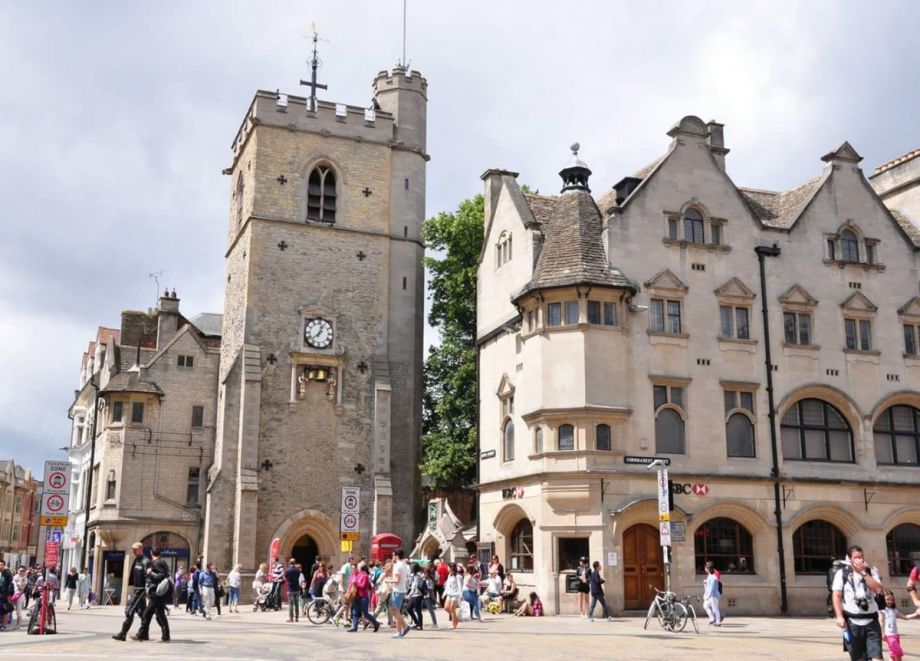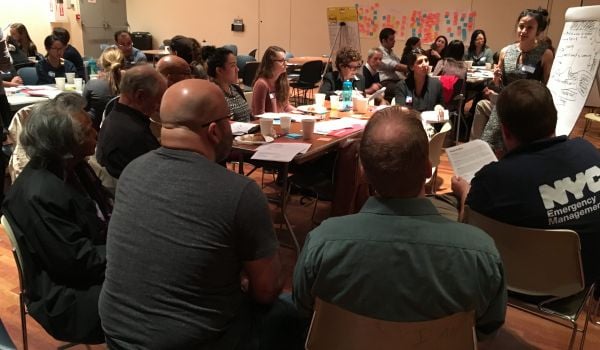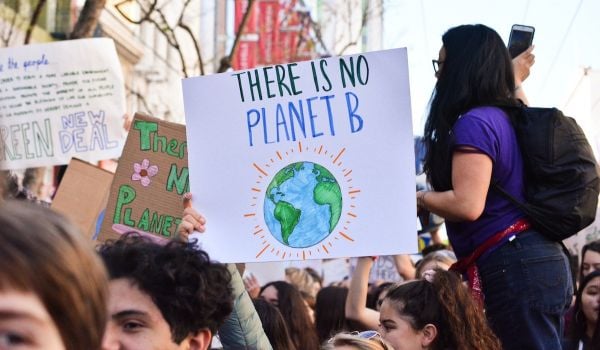In April 2019, thousands of demonstrators occupied five bridges in London. The protests kicked off a massive campaign of civil disobedience and, by June 2019, the UK government had given in to one of their demands: to establish a citizens’ assembly to devise policy to tackle the climate crisis.
Cities across the UK have followed suit, establishing citizens’ assemblies and juries to contribute to their local climate action plans. Members of the public, community organizations, businesses, and academic institutions, are also being called upon to join public-private task forces that advise cities on climate action, help write climate action plans, and help monitor their progress.
This wave of engagement has enabled British cities to set some of the most ambitious climate action targets in the world, with goals to hit carbon neutrality by 2030. That’s 20 years before most leading North American cities’ targets.
As COP26 — which has been billed as the world’s last best chance for climate action — gets underway in Glasgow, it’s worth taking note of British cities’ techniques and what communities around the world can learn from them.
One key takeaway: community engagement. Last year, we researched the successes and challenges facing 12 British local governments taking climate action and found that deep community engagement stood out as key to their successes.
Democratizing Climate Engagement
As the world struggles to meet the Paris Treaty targets of limiting global warming to 1.5°C and climate action is hindered by debates that pit the economy against the environment, it can be a struggle for governments to attain widespread support for climate action or agreement on what that action looks like. Cities often invest significant resources in the technical dimensions of this problem, modelling how quickly they can reduce emissions, what actions they must take, and how it will affect the economy. This is all critical, but something less technical is also key: Getting people with diverse interests and backgrounds to connect and figure out how society as a whole can help solve the problem.
As simple as that sounds, it’s not necessarily easy, nor is it the status quo. In Canada and the United States, where our company helps cities create climate action plans, communities have spurred local governments to act on climate change. They have also typically been given a chance to contribute to climate plan creation through surveys, focus groups, town halls, and more. But in Britain, our research found that cities that went beyond these typical engagement processes, who involved residents more meaningfully in the planning process, can foster plans with increased ambition and support.
For example, some UK cities use citizens’ assemblies, which recruit members of the public who are demographically representative of their communities in terms of income, race, and age. People are invited to take part through a randomized process. Their feedback is public and influences City decisions.
In 2019, Oxford became the first British city to create a citizens assembly on climate change, which was livestreamed on social media. The assembly included 50 residents who were broadly representative of Oxford’s demographics. They identified widespread public support for Oxford to take more ambitious climate action. Their recommendations prompted the City to commit an additional £1 million to its climate action efforts and laid a foundation for it to undertake one the most ambitious smart grid trials in the UK.
Policies for the Community, by the Community
Achieving net-zero emissions by 2030 (or 2050, for that matter) requires policies that go beyond the traditional reach of municipal governments. Cities need support from higher levels of government, as well as industry, businesses, community groups, and members of the public, to help implement climate actions, like retrofitting houses and offices to improve energy efficiency, increasing public transit use, or creating a low-carbon business district.
Getting the community at the table right from the start helps. In addition to citizens’ assemblies, many British cities have tackled this challenge with public-private task forces that bring together members of the public, industry, community groups, Council members, utilities, and more. These groups oversee the design of the city’s climate strategy, and, in some cases, help with implementation.
The task forces unite groups with competing interests. In Glasgow, representatives from all political parties are working alongside representatives from Glasgow Chamber of Commerce and climate activists to develop a climate action plan. In Leeds, the city’s Climate Commission, including members from academia, business, community groups, and the national healthcare provider, monitors the city’s progress on reducing carbon emissions.
Similarly, more than 900 organizations in Bristol, including businesses, churches, and environmental organizations, united under the Bristol Green Capital Partnership to provide input into policy, collaborate on sustainability initiatives, and engage the public. The group helped the city get resident buy-in for ambitious environmental goals and initiatives that helped Bristol secure the title of 2015 European Green Capital.
A Network of Champions
Further north in Manchester, climate action is driven by members of the Manchester Climate Change Partnership, who proposed the City’s net-zero emissions by 2030 target. A representative of the Manchester City Football Club worked alongside the Dean of Manchester, the local climate change youth board, the electricity utility, Council members, and others to develop a climate action plan for Manchester to reach this goal.
Network members also champion the cause with their own commitments. For example, the City Football Club, Manchester Metropolitan University, and a network of multi-faith centers of religious worship, among others, report on their buildings and transport emissions and take steps to reduce them, in line with Manchester’s goals.
With such deep, democratic engagement, cities can hit the ground running with climate actions pre-approved by the community. Departments from across the city, industry, and institutions, are aware of the plan and how it will affect them. In many cases, they’ve even co-authored it.
The climate emergency demands an emergency response, on par with pandemic lockdowns or wartime efforts. Everyone must be involved. British cities have shown that deep, democratic engagement in which politicians work hand-in-hand with members of the public, businesses, non-profits, academics, and youth, is one way to make substantial progress.
Kyra Bell-Pasht is a consultant at Sustainability Solutions Group (SSG), a climate planning consultancy that develops climate action plans for municipalities across North America.
Alia Dharssi is a consultant at Sustainability Solutions Group (SSG), a climate planning consultancy that develops climate action plans for municipalities across North America.
















